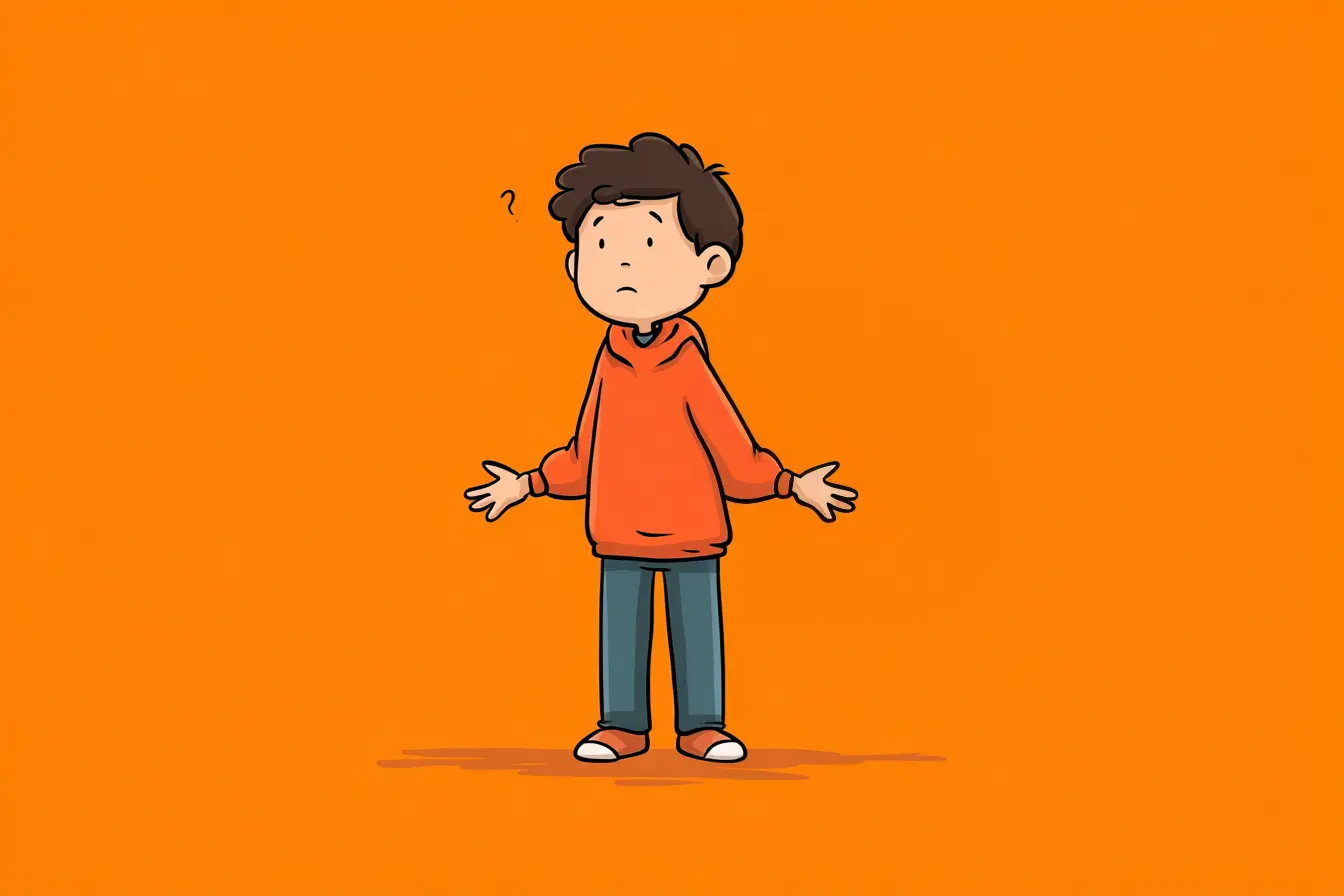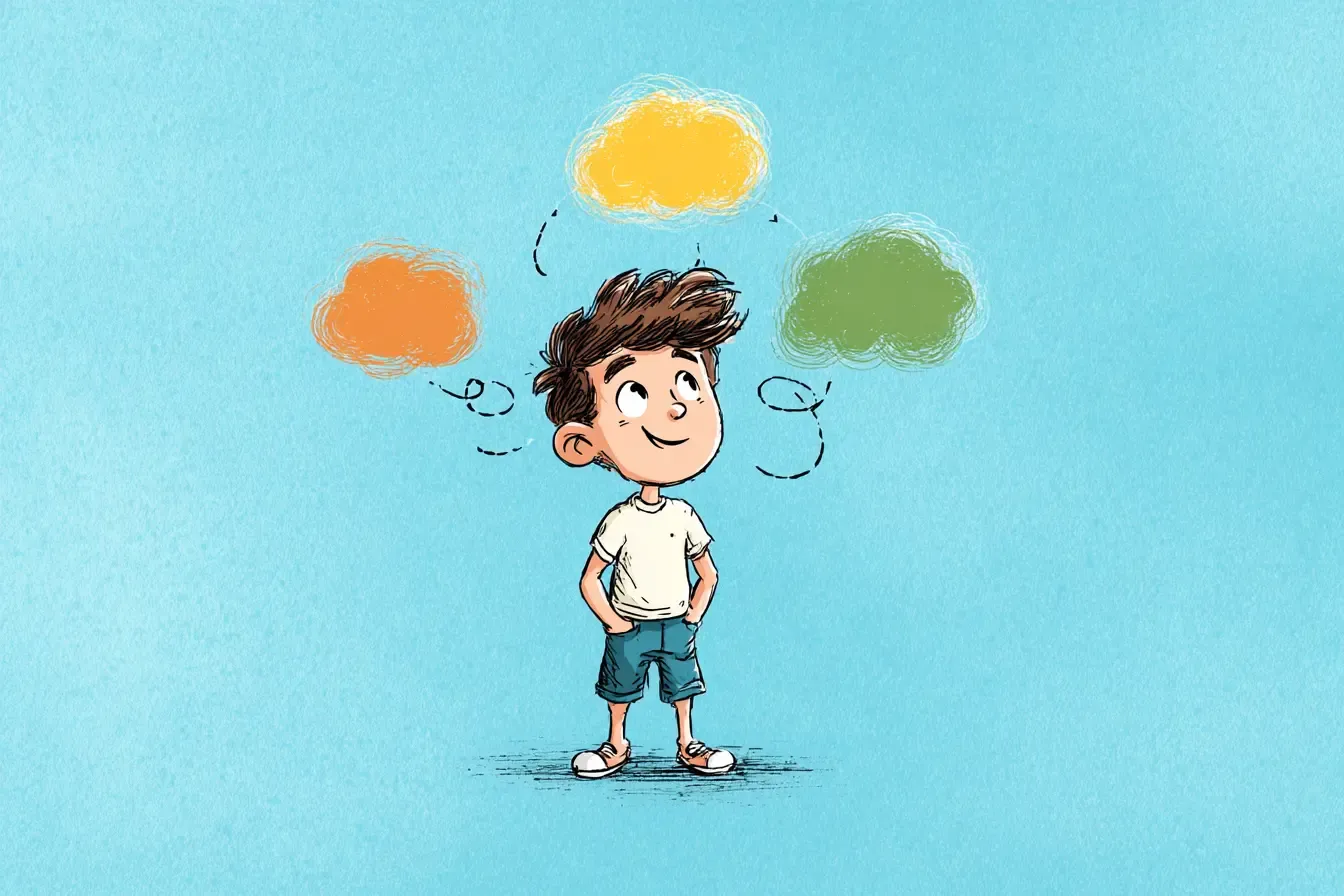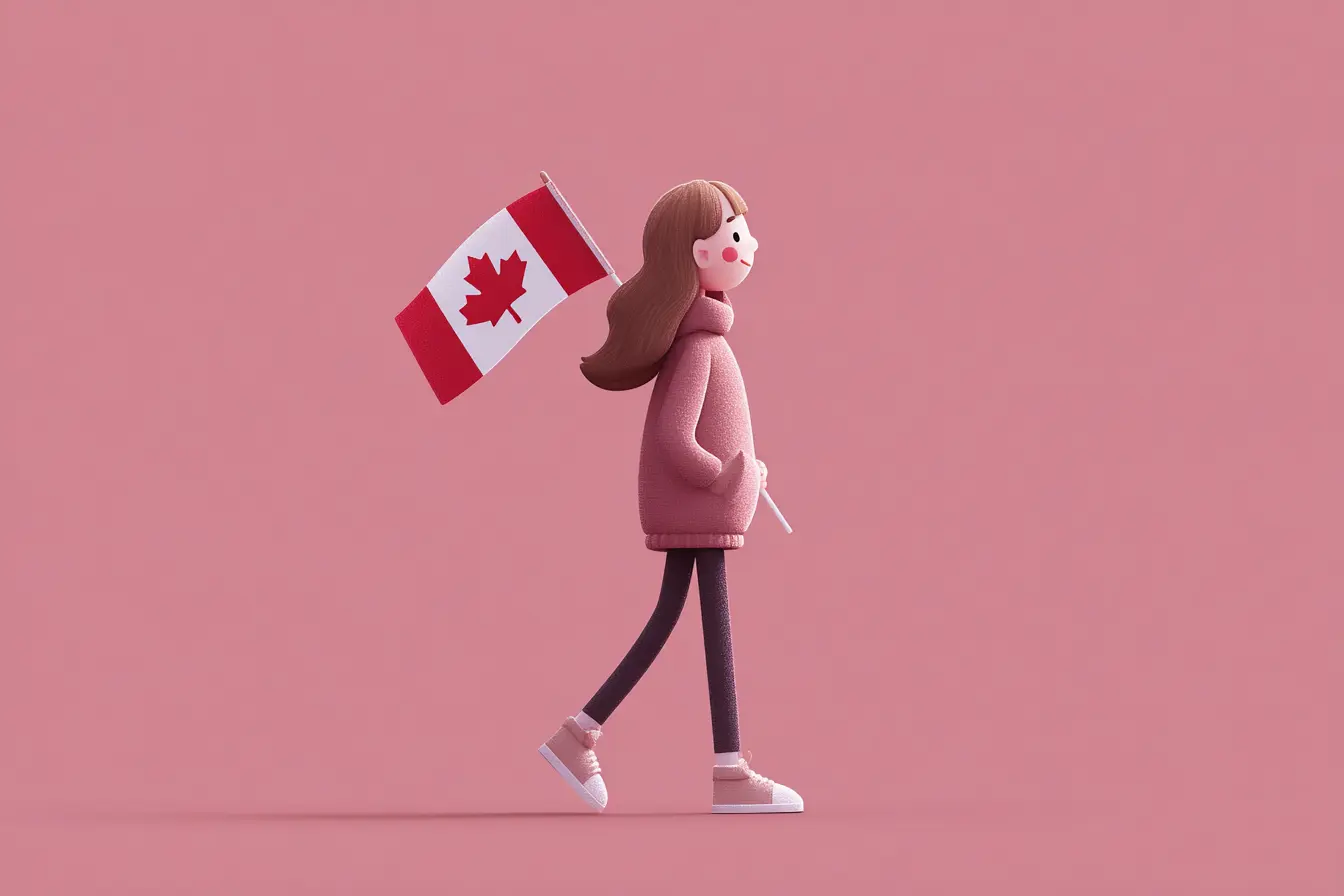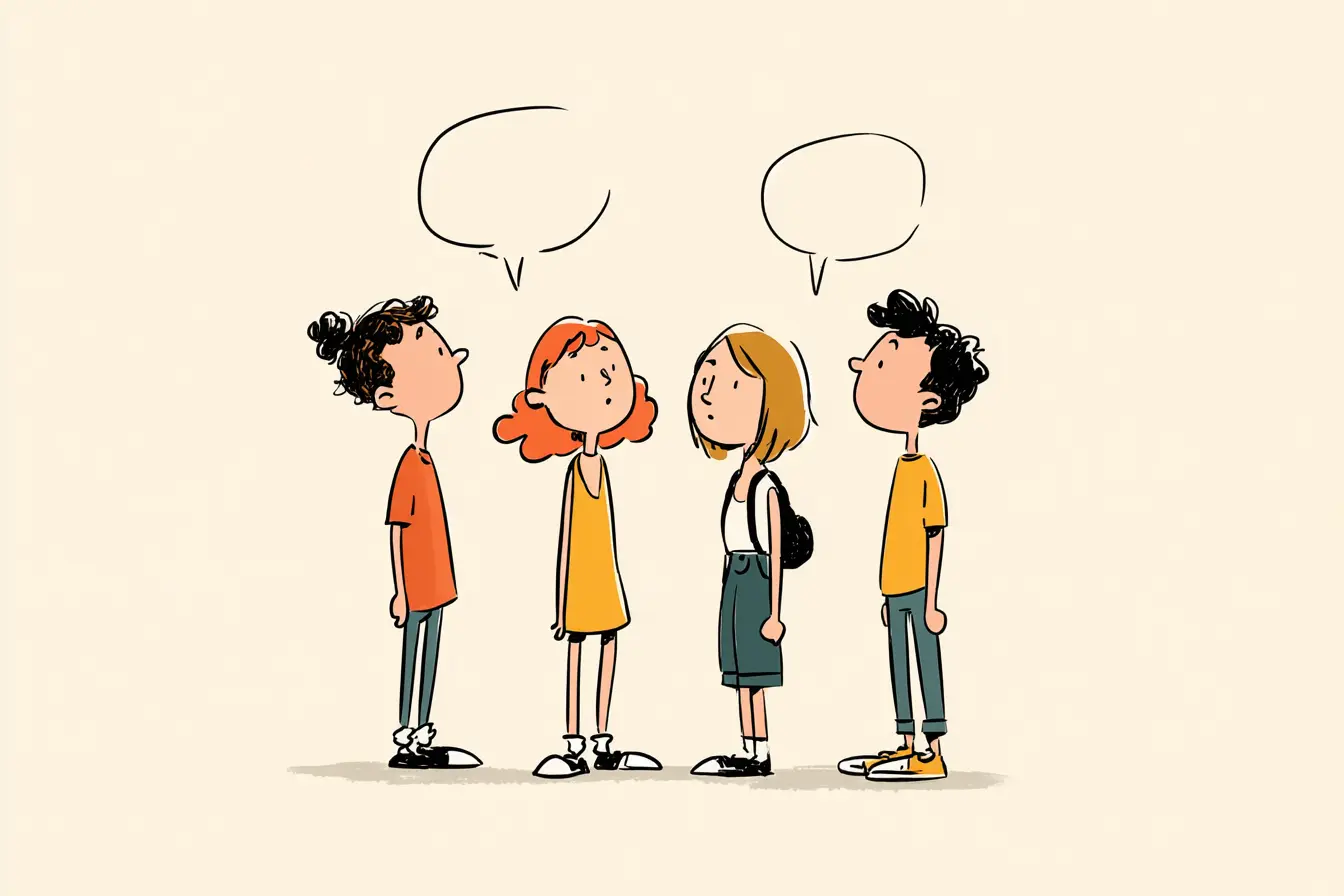Los phrasal verbs son una parte fundamental del inglés que a menudo confunden a los estudiantes. El verbo "get" es uno de los más versátiles y frecuentemente usados en inglés. Cuando se combina con diferentes preposiciones o adverbios, su significado cambia significativamente. ¡Exploremos el mundo de los phrasal verbs con "get" y aprendamos a dominarlos!
¿Por qué son importantes los phrasal verbs?
Los phrasal verbs son comúnmente usados en inglés. Hacen que la comunicación sea más natural y expresiva. Dominarlos puede ayudarte a sonar como un hablante nativo y a entender conversaciones o textos con mayor facilidad.
Referencia rápida: Phrasal Verbs con "Get"
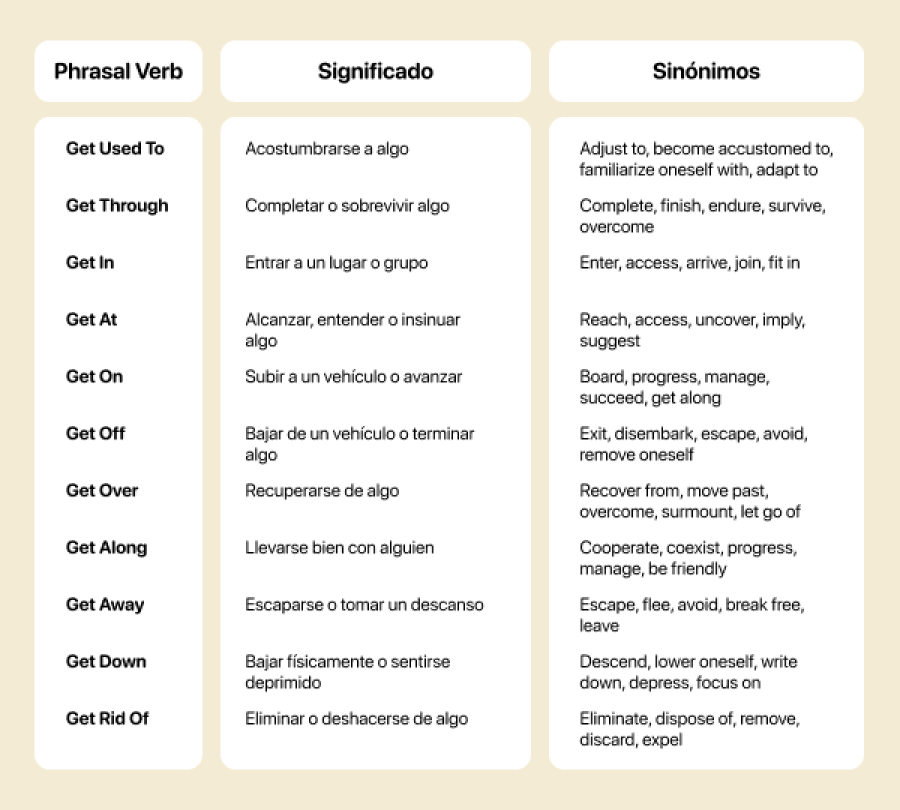
1. Get Used To
Significado: Acostumbrarse a algo con el tiempo.
Ejemplos:
- "I never could get used to the way she spoke her mind so freely, but there was no denying her honesty."(Nunca pude acostumbrarme a la forma en que hablaba con tanta franqueza, pero no podía negar su honestidad.)
— Louisa May Alcott, Little Women (1868) - "The young sailor found it hard to get used to the restless motion of the ship during his first voyage."(El joven marinero tuvo dificultades para acostumbrarse al movimiento inquieto del barco durante su primer viaje.)
— Herman Melville, Moby-Dick (1851) - "We must get used to the idea that things may not always be as they seem."(Debemos acostumbrarnos a la idea de que las cosas no siempre son como parecen.)
— Jane Austen, Pride and Prejudice (1813)
Tip: Este phrasal verb se usa a menudo con un sustantivo o un gerundio (-ing).
2. Get Through
Significado: Superar o completar algo desafiante.
Ejemplos:
- "I scarcely know how I shall get through this tiresome business without your help."(Casi no sé cómo voy a superar este tedioso asunto sin tu ayuda.)
— Jane Austen, Sense and Sensibility (1811) - "The old sailor seemed determined to get through his tale, no matter the interruptions."(El viejo marinero parecía decidido a terminar su historia, sin importar las interrupciones.)
— Robert Louis Stevenson, Treasure Island (1883) - "He read the letter twice, struggling to get through the cramped and untidy handwriting."(Leyó la carta dos veces, esforzándose por descifrar la escritura desordenada y apretada.)
— Charles Dickens, David Copperfield (1850)
Úsalo cuando: Se refiere a superar dificultades o completar tareas.
3. Get In
Significado: Entrar en un lugar, vehículo o grupo.
Ejemplos:
- "We must hurry if we are to get in before the gates are locked for the night."(Debemos apresurarnos si queremos entrar antes de que cierren las puertas por la noche.)
— Bram Stoker, Dracula (1897) - "I saw him get in through the window, though he thought no one was watching."(Lo vi entrar por la ventana, aunque él pensaba que nadie lo estaba observando.)
— Arthur Conan Doyle, The Adventures of Sherlock Holmes (1892) - "He bid us to get in the carriage, for the hour was growing late."(Nos pidió que subamos al carruaje, ya que se hacía tarde.)
— Charles Dickens, A Tale of Two Cities (1859)
Tip adicional: Para vehículos, usa "get in" para autos y "get on" para autobuses o aviones.
4. Get At
Significado: Alcanzar, entender algo o insinuar algo indirectamente.
Ejemplos:
- "If we could only get at the treasure before they return, we might escape with our lives."(Si tan solo pudiéramos alcanzar el tesoro antes de que regresen, podríamos escapar con vida.)
— Robert Louis Stevenson, Treasure Island (1883) - "She hinted at something important, but I could not get at the meaning behind her words."(Ella insinuó algo importante, pero no pude entender el significado detrás de sus palabras.)
— Jane Austen, Pride and Prejudice (1813) - "No man alive shall get at the secret hidden within these walls!"(¡Ningún hombre vivo alcanzará el secreto oculto dentro de estas paredes!)
— Charlotte Brontë, Jane Eyre (1847)
Úsalo cuando: Alguien insinúa o trata de expresar una idea sutilmente.
5. Get On
Significado: Subir a un vehículo o avanzar en algo.
Ejemplos:
- "They struggled to get on the horse, but its restless movements made the task difficult."(Lucharon por subirse al caballo, pero sus movimientos inquietos hicieron la tarea difícil.)
— Anna Sewell, Black Beauty (1877) - "We must get on with our journey, for the sun is already sinking below the hills."(Debemos continuar con nuestro viaje, ya que el sol ya se está poniendo detrás de las colinas.)
— L. Frank Baum, The Wonderful Wizard of Oz (1900) - "If you wish to get on in society, you must first learn to mind your manners."(Si deseas progresar en la sociedad, primero debes aprender a cuidar tus modales.)
— Oscar Wilde, The Picture of Dorian Gray (1890)
Tip: El contexto determinará si se refiere a transporte o progreso.
6. Get Off
Significado: Bajar de un vehículo o desconectarse de algo.
Ejemplos:
- "The conductor helped her get off the train with her small trunk in tow."(El conductor la ayudó a bajar del tren con su pequeño baúl a cuestas.)
— Edith Wharton, The Age of Innocence (1920) - "He tried to get off the topic, but she insisted on pressing him for an answer."(Él trató de salir del tema, pero ella insistió en presionarlo por una respuesta.)— Jane Austen, Persuasion (1818)
- "She would get off lightly this time, but he warned her to tread carefully in the future."(Esta vez saldría ilesa, pero él le advirtió que procediera con cuidado en el futuro.)
— Thomas Hardy, Far from the Madding Crowd (1874)
Úsalo cuando: Hablas de bajar de autobuses, trenes o aviones o de desconectarte de algo.
7. Get Over
Significado: Recuperarse de una enfermedad, situación difícil o decepción; superar un obstáculo.
Ejemplos:
- "You must get over your fears if you wish to move forward with courage."(Debes superar tus miedos si deseas avanzar con valentía.)
— Louisa May Alcott, Little Women (1868) - "How he managed to get over the wall without anyone noticing, I cannot say."(Cómo logró superar el muro sin que nadie lo notara, no lo puedo decir.)
— Arthur Conan Doyle, The Adventures of Sherlock Holmes (1892) - "She was determined to get over the insult and maintain her composure."(Ella estaba decidida a superar el insulto y mantener la compostura.)
— Jane Austen, Pride and Prejudice (1813)
Tip: Se usa comúnmente para recuperación emocional o física.
8. Get Along
Significado: Llevarse bien con alguien o manejar una situación.
Ejemplos:
- "He was eager to get along with the task at hand and refused to be delayed any longer."(Estaba ansioso por avanzar con la tarea en cuestión y se negó a retrasarse más.)
— Charles Dickens, Great Expectations (1861) - "The children did not get along at first, but soon they became the best of friends."(Los niños no se llevaban bien al principio, pero pronto se convirtieron en los mejores amigos.)
— Frances Hodgson Burnett, The Secret Garden (1911) - "I wonder how you will get along in this strange new city without a guide or companion."(Me pregunto cómo te las arreglarás en esta nueva y extraña ciudad sin un guía o compañero.)
— Thomas Hardy, Tess of the d'Urbervilles (1891)
Recuerda: Se usa a menudo para describir relaciones armoniosas.
9. Get Away
Significado: Escaparse o irse de vacaciones; evitar el castigo.
Ejemplos:
- "We must get away before they notice our absence and come searching for us."(Debemos escaparnos antes de que noten nuestra ausencia y vengan a buscarnos.)
— Robert Louis Stevenson, Treasure Island (1883) - "She longed to get away from the noise and confusion of the bustling city streets."(Ansiaba alejarse del ruido y la confusión de las concurridas calles de la ciudad.)
— Thomas Hardy, Far from the Madding Crowd (1874) - "If he could only get away unseen, he might yet salvage his dignity."(Si pudiera escaparse sin ser visto, aún podría salvar su dignidad.)
— Charles Dickens, Great Expectations (1861)
Tip: El contexto determinará si significa escaparse o relajarse.
10. Get Down
Significado: Bajar físicamente o sentirse deprimido.
Ejemplos:
- "Pretty soon I wanted to smoke, and asked the widow to let me. But she wouldn't. She said it was a mean practice and wasn't clean, and I must try to not do it any more. That is just the way with some people. They get down on a thing when they don't know nothing about it."(Muy pronto quise fumar y le pedí a la viuda que me dejara. Pero ella no quiso. Dijo que era una práctica mala y poco limpia, y que debía intentar no hacerlo más. Así son algunas personas. Se deprimen por algo cuando no saben nada al respecto.)
— Mark Twain, The Adventures of Huckleberry Finn (1884) - "It was a high hill, and they had to get down carefully to avoid slipping on the wet grass."(Era una colina alta, y tuvieron que bajar con cuidado para evitar resbalar en la hierba mojada.)
— Thomas Hardy, Far from the Madding Crowd (1874) - "When they reached the end of the journey, they were eager to get down and stretch their legs."(Cuando llegaron al final del viaje, estaban ansiosos por bajar y estirar las piernas.)
— Charles Dickens, David Copperfield (1850)
Tip: El tono y el contexto son clave para entender el significado.
11. Get Rid Of
Significado: Eliminar o deshacerse de algo no deseado.
Ejemplos:
- "I will not rest until I can get rid of this troublesome matter once and for all."(No descansaré hasta deshacerme de este asunto problemático de una vez por todas.)
— Charles Dickens, Great Expectations (1861) - "She tried to get rid of her fears, but the dark forest filled her with dread."(Ella intentó deshacerse de sus miedos, pero el oscuro bosque la llenó de pavor.)
— L. Frank Baum, The Wonderful Wizard of Oz (1900) - "It is impossible to get rid of the memories that cling to the old house like shadows."(Es imposible deshacerse de los recuerdos que se aferran a la vieja casa como sombras.)
— Charlotte Brontë, Jane Eyre (1847)
Uso común: Limpiar, deshacerse de cosas no deseadas o terminar malos hábitos.
Consejos para dominar los Phrasal Verbs con "Get"
- Aprende en contexto: Practica usando los phrasal verbs en oraciones relacionadas con tu vida diaria.Por ejemplo: "I need to get rid of old clothes I don’t wear anymore." (Necesito deshacerme de ropa vieja que ya no uso.)
- Mira y escucha: Las películas, los programas de televisión y las conversaciones en inglés son excelentes fuentes para escuchar cómo se usan los phrasal verbs de manera natural.
- Practica con amigos: Úsalos en conversaciones informales para ganar confianza y fluidez.
FAQ
1. ¿Son formales o informales los phrasal verbs con "get"?
Generalmente, los phrasal verbs con "get" se usan en inglés conversacional o informal. Sin embargo, algunos pueden emplearse en contextos formales, dependiendo de la situación. Por ejemplo, get rid of puede usarse en un correo profesional, mientras que get down (en el sentido de sentirse deprimido) es típicamente coloquial.
2. ¿Cuál es la diferencia entre "get in" y "get on"?
- Get in: Se usa para entrar a espacios cerrados o vehículos pequeños, como autos o habitaciones.Ejemplo: "She got in the car and left." (Ella se subió al auto y se fue.)
- Get on: Se usa para vehículos grandes, como autobuses, trenes o aviones, y también para progresar en algo.Ejemplo: "We got on the bus and found our seats." (Subimos al autobús y encontramos nuestros asientos.)
Los phrasal verbs con "get" pueden parecer abrumadores, pero con práctica constante y comprensión, comenzarás a usarlos de manera natural. ¡Continúa practicando y explorando el idioma!
Si deseas seguir mejorando tu inglés, consulta nuestro artículo sobre cómo pedir comida en inglés.





